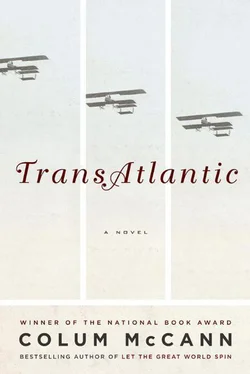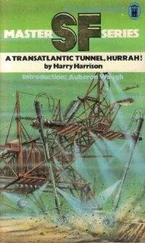He gestured towards a maroon-colored Rover with spoked wheels and a tall silver ornament on the hood.
— Sir Arthur is expecting us, he said.
— Is it a long drive?
— Afraid so, yes. We might not get there until nightfall. Make yourselves comfortable. I’m afraid the roads are rather bumpy.
When he bent to pick up the traveling trunk he exposed a wedge of skin at the small of his back. Emily took the front seat. Lottie settled in the back. The car pulled away from the docks. They drove out of the city into a sudden bright sunlight and a tunnel of chestnut trees.
THE ROAD RATTLED through them. On occasion the shadows fretted them as they went beneath an arc of trees. The hedges were long and green and manicured. They seemed to coax the car along.
They were traveling at close to forty miles an hour. Emily glanced at her daughter in the backseat, the wind nibbling at the low of her blouse. The blue of the sky had barely changed since noon. The road was largely empty. She thought the English countryside at ease with its order. Nothing at all like Newfoundland. The fields were angular. They could see a great distance, the ancient highways narrowing towards the horizon, an empire quality to it, regimented, well-mannered. Different from what she had expected. No coal mines, no slag heaps, no gray English slouch.
It was difficult to talk over the noise of the engine. On the outskirts of Bristol they stopped at a small tea shop. Ambrose took off his cap and revealed a head of curly fair hair. He spoke with a curious accent. Belfast, he told them, but Emily figured from the way he said it that he must have been a child of privilege. His accent was more English than Irish. A musical formality to it.
He had been with the RAF for a few years now, in the communications division, but had never graduated to the flying division. He patted his stomach as if to make an excuse.
The sky darkened. Lottie called out instructions from a giant map that gunneled in the wind. Ambrose glanced backwards at Lottie as if she herself might suddenly take flight, a parachute of intrigue.
AS THE LIGHT failed, Ambrose geared the Rover down, banked the corners skillfully, headed into another long stretch of hedges. They neared Wales. A series of small hills, like a sleeping woman silhouetted sideways.
By early evening they were lost. They pulled up to the edge of a field and watched a falconer ply his art: the bird being trained on the end of a string, the long curl of his flight slowly learning its limits. It hovered a moment, then landed superbly on the falconer’s glove.
THEY WERE FORCED to stop in Cardiff for the night. A dingy hotel. The air hinted of sea and storm. Emily felt feverish again, lightheaded. Lottie helped her up the stairs and slipped into bed beside her.
In the morning, they drove out along the coast road. The sun rose high behind them, burning off the fog. Children waved from the sides of ditches, boys in gray shorts, girls in blue pinafores. Some were barefoot. A few bicycles came rolling along, mud-splattered and rickety. An old woman waved a walking stick in the air and shouted something in a language they couldn’t understand. A line of golden hayricks crossed a field.
The three of them stopped by a narrow stream and shared a flask of hot tea, using just the one cup, shaking the last of the contents into the grass. Emily shuffled along the river. She could hear Lottie’s laughter ring high in the air. Down by a bend, at an overhang of trees, Emily saw an older man standing in high wading boots. He had a fishing rod but he made no motion at all, just stood thigh-deep in the water, contemplating. As if rooted in the stream. She raised her hand to wave, but he looked beyond her. She was glad for the anonymity. She was certain now that she would speak to Brown alone.
The man in the river turned, but still he didn’t cast his rod. It was as if he was there to hook the light. She raised her hand again and he nodded, more out of obligation than friendliness, she was sure.
When she returned to the stream bank, Ambrose and Lottie were huddled together, sharing a cigarette.
THE HOUSE LAY on the western outskirts of Swansea. At the edge of the water. Down a long laneway of painted white fences. Large, redbrick, garreted. Emily counted three chimneys. The gravel crunched under the tires. They pulled to a stop. Ravens flew from the eaves. The long limbs of a chestnut tree scratched against the roof of the house.
Brown’s wife, Kathleen, came to the doorstep to greet her. She was dark-haired, serious. Pretty in a guarded way. She guided Emily into a wainscoted living room. Tastefully decorated. Long maroon curtains bracketed two French windows, which led into a manicured back garden. The wind seemed interested in the curtains: it came through the parted doors and ruffled the material, sniffed about, toured the room. Photographs on the shelves. One of Alcock and Brown together with the King of England. Another with Churchill. Aviation books ranged the shelves. Large leather-bound volumes in maroon and beige. Some cut-glass awards and framed certificates perched on small wooden frames. A dozen old yellow roses with red-streaked petals sat dying in a large vase on the table.
Emily struggled into a chair by the window. A single cup and saucer had been left on the carpet by the edge of the divan, forgotten. Some forlorn crumbs on the edge of the saucer. She looked all about her, the room, the green lawn out the window, the silvery sea. It had taken many letters to the RAF to track Brown down. There were rumors of whiskey, of brokenness, of failure. That he envied the celebrity of Lindbergh. That he had lost his nerve. In photographs it had struck her that he was on the verge of disintegration.
From upstairs she could hear the creak and moan of footsteps. There was a sound like the dragging of furniture. Doors closing.
Kathleen put her head around the door frame. Her husband, she said, would be down in just a jiffy, he was looking for something, he extended his apologies. Her hair was a sleek curve of water.
Moments later Kathleen came in again, left Emily with a black lacquered tray of tea and biscuits. A pattern on a saucer. A circularity. No beginning, no end. Striding across the fields of St. John’s ten years ago. Sleeves of ice on the grass. Watching the practice runs at night. The sound of the Vimy throttling in. The rattleroar. The catch of it on the grass. The small spray of muck in the air.
From somewhere came the voice of a child. Emily brought her chair closer to the window, looked down the run of hill towards the sea, gray and corrugated.
She was startled by a low cough. The door was open. Brown stood silhouetted against the light. The shape of a shadow. A young boy stood in front of him, dressed in a crisp sailor suit. His hair was neatly combed. His shorts were pressed. Elastics on his long socks. Brown closed the door. The dark clarified him. He himself was dressed in tweed with a tie firm against his throat. He put his hands to the boy’s shoulders and guided him forward. The boy, well-practiced, extended his hand.
— A pleasure to meet you.
— And you. What’s your name?
— Buster.
— Ah, that’s a wonderful name. I’m Emily.
— I’m seven.
— I was once, too, believe it or not.
The young boy glanced backwards at his father. Brown’s hands curled more deeply around the boy’s shoulders, then he tapped him twice and the boy turned immediately and ran towards the French windows. He threw the doors fully open and a strong smell of the sea burst into the room.
They watched as the boy ran out past the garden towards a tennis court where he jumped over the sagging net and disappeared behind a row of hedges.
— A sweet boy, Mr. Brown.
— He’d run all day if you gave him the chance. Teddy.
Читать дальше












